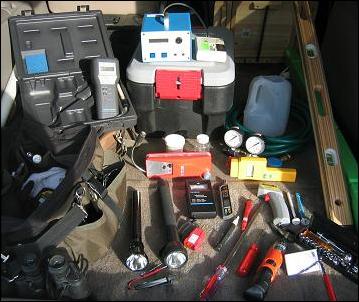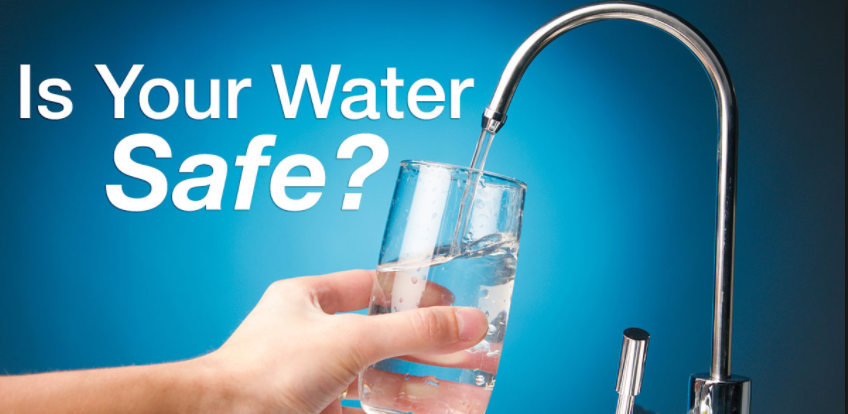Well Water Testing and Inspection Course
Well Water Testing and Inspection Course is an online training program we have developed to teach home inspectors the health, safety, and welfare issues surrounding Well Water Testing as part of the home inspection process. Home inspectors who complete this course will learn how to perform well water testing, details surrounding Well Water Testing procedures, and what to do if you detect the presence of bacteria or pollutants while performing your well water testing as part of a home inspection.
For the most part Well Water Testing falls outside of the standards of practice for common home inspection. That said, you will have home inspection clients from time to time who will ask questions about the water quality and the condition of their well during a home inspection. As a home inspector you will want to be able to provide answers to those questions. Below you’ll find a sample of our Well Water Testing and Inspection course.
who complete our Well Water Testing and Inspection course will be able to automatically print the certificate of completion after passing the included exams. The Well Water Testing and Inspection Course is included free of charge for students who enroll in our online home inspection course or any of our classroom home inspection training courses.

Home Inspection
The most popular service we offer, a general home inspection is a comprehensive and detailed evaluation of the visible and accessible major elements of the home, performed in accordance with the ASHI Standards of Practice and Code of Ethics. Inspection time is usually 2 1/2 to 3 hours. Attending the inspection is a great visual and hands on learning experience for first time and veteran buyers. Clients receive a combination checklist and narrative report at the conclusion of the inspection.
Individual Element Inspection
Occasionally, a lender may require a single element be evaluated prior to closing. We can provide quick service to inspect a roof, foundation, electrical panel, etc. and fax or e-mail to the client, agent or lender to expedite the transaction.
EIFS Inspection
The best way to get an unbiased, accurate evaluation of the EIFS cladding on your home is to have a qualified third party inspector test for moisture in the substrate behind the cladding. Wells has been certified by the Exterior Design Institute and Moisture Warranty Corporation to perform EIFS inspections according to protocol they developed to evaluate the condition and performance of the cladding
Radon Testing
Radon is a cancer-causing, radioactive gas. It is invisible, odorless, and tasteless. The National Academy of Sciences estimates that radon causes between 15,000 and 22,000 lung cancer deaths each year in the U.S. The Biological Effects of Ionizing Radiation Committee concludes that after smoking, radon is the second leading cause of lung cancer deaths in the U.S.
Well Inspection
In conjunction with a general inspection, we can provide a cursory evaluation of the private water system on-site. This includes drawing a measured volume of water to check flow rate and cycle time of well pump, if applicable. A visual inspection is made of well casing, pressure tank and accessible equipment.
Water Potability Testing
Potability testing is a checking for the presence of the most common bacteria found in private water sources (Coliform, E-coli, & Fecal coliform). A water sample from the subject property is delivered to EPA approved lab for analysis. Results are generally available from lab in 24 to 48 hours and are forwarded to client immediately upon receipt.

Water Testing
When buying or selling a home, water quality testing is an essential part of health and safety inspections. The findings of a water testing inspection could make or break a successful sale. If it is determined that the water is not potable, the home’s entire plumbing system could need to be replaced, which could cost tens of thousands of dollars.
During a water testing inspection, members of the Inspect-It 1st team will use a water quality test to measure the following:
Acidity levels
Chlorine levels
Water Hardness
Iron
Copper
Nitrates & nitrites
Water Testing
Home water testing basics
Water is one of our earth’s most valuable natural resources and the United States has one of the safest water supplies in the world. But water quality and treatment varies depending upon location. We often take for granted that the water coming out of the kitchen faucet is clean and safe to drink
Where does water come from?
Water can be found in lakes, rivers or reservoirs and lots of other places like mountain springs for example. Aquifers are one of the earth’s most precious natural resources and the water in them is often referred to simply as groundwater. These aquifers can be thought of as enormous underground lakes, or porous deposits of gravel or sediment containing the ground water.
The water flows through the permeable layers and people extract the water using a variety of methods such as the private water wells and cisterns that supply homes in rural areas where access to a public water supply does not exist. The supply of water to a private home can be supplied from lots of different sources. The geographic areas where aquifers are located can be very large, in fact, as large as hundreds of miles and can stretch across state lines.
It’s easy to say, oh no, it’s raining but remember, precipitation in the form of rain, snow, sleet or hail for example acts to replenish the supply of water in the aquifers. The supply of water available is always important for home dwellers. A water shortage can result when the rate of water usage exceeds the amount of precipitation that is capable of replenishing the water supply which is why you may see in certain areas of your own state, signs that say: “water your grass on odd days if your address is an odd number; water your grass on even days if your address is even.”
What is the difference between well water and a public water supplier?
Public water suppliers are regulated by organizations such as the EPA and DEP and state agencies. On the other hand a private well is just one of several methods home owners may utilize to supply a home with water. Private well water is not regulated. Therefore the maintenance and protection of the well is the sole responsibility of the home owner. Home owners may want to consider having their private well tested on an annual basis which for most folks can simply be a matter of adding this activity to the usual basic home maintenance items. It’s probably a good idea to be aware of any current activities in your local area that may affect your water quality and quantity as well.
Well Water Testing
Private Well Users
Well Water Users should test their water regularly to ensure clean quality water. If you are purchasing a home or if your water quality hasn’t been tested for a while, we recommend that you schedule a well water quality test right away. All Private Well Users, at the minimum, should check for Coliform Bacteria every year, and every other year for Nitrates. All Well Water Testing lab results are emailed, normally within 2-3 business days.
Real Estate Transactions
Well Water testing as a requirement for real estate loan processing is becoming more common. In the real estate market, we understand that time is money. Real Estate transactions including the loans, whether conventional, FHA or VA require testing of well water as a condition of the mortgage. State certified lab Results will be available in 2-3 days depending on testing requirements. Get peace of mind about the water safety in your new home.
Which Test is Required for Loan processing?
Q:Which water tests are required for a Conventional Loan?
A: The water test requirement is at the home loan provider’s discretion. In most cases it is at least Coliform Bacteria and Nitrates.
Q: Which water tests are required for HUD, FHA, VA and Rural Development home loans?
A: Coliform Bacteria, E-Coli, Nitrites, Nitrates, Lead and Arsenic.
Pricing
Conventional Loans
Cost for this test is $125.00 when bundled together with a home inspection or $150.00 as an individual water test, which includes trip charges.
FHA/VA
FHA/VA requirements require lead and Arsenic to also be tested. The cost for this test is $200.00 when bundled together with home Inspection, or $225.00 as an individual water test, which includes trip charges.